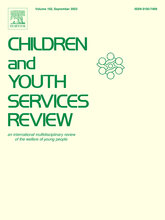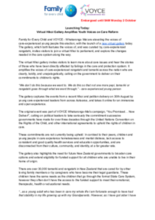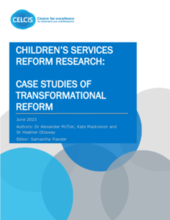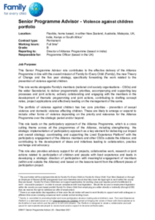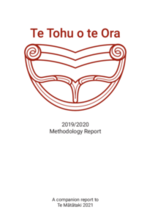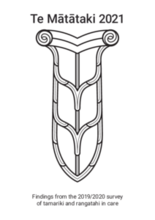Displaying 11 - 20 of 70
This analysis considers foster care regulations in three jurisdictions in Finland, New Zealand, and Wisconsin, USA, and the effects of policy decisions on eligibility for relative caregivers and placement options for children in out-of-home care.
Family for Every Child’s Virtual Gallery is dedicated to the voices of children and young people from around the world, exploring the issues that affect them and their care. They collaborated with VOYCE – Whakarongo Mai to support the “You Promised… Now Deliver!” campaign, and developed a gallery that highlights children and young people’s perspectives on care in Aotearoa via a virtual hikoi to parliament.
Case studies of transformational reform programmes examined a range of approaches to the delivery of children’s services to better understand the evidence regarding systems-level integration between children’s social work/social care with health services and/or adult social care.
This Family for Every Child podcast episode explores the context for children and young people with care experience in New Zealand.
This article presents Kaupapa Māori research undertaken by a mokopuna Māori with the lived experience of state care in New Zealand, alongside established Kaupapa Māori researchers. Literature containing the voices of care-experienced mokopuna Māori was reviewed to explore what conditions exist and are needed to uphold wellbeing.
Salary:
GBP £50-55,000 equivalent - fixed in local currency. Salary will be determined based on experience and adjusted to the local market rate.
Family for Every Child is seeking to hire a programme advisor based in New Zealand. This role is home based and flexible working patterns are possible, with the expectation that regardless of time zone you will be able to work flexibly to support work with colleagues in different time zones including occasional work outside normal working hours.
This methodology report is a companion to Te Mātātaki, the first national survey of tamariki and rangatahi in care in New Zealand.
This report presents findings from Te Tohu o te Ora, the first national survey of tamariki and rangatahi in care.
In this How We Care series webinar, Family for Every Child presented the programming of three CSOs on how they are supporting kin carers and the vulnerable children in their care, in their respective regions.

